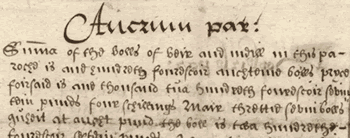|
Until the middle of the 19th century a wide diversity
of weights and measures were used in Scotland.
Standardization took place from 1661 onwards,
and in 1824 an act of parliament imposed the English
versions of Imperial measures and defined the
proportions of older measures to Imperial measures.

Image
of the 1649 valuation roll for Ancrum parish showing
the use of old Scots measures
(for a full transcript see the foot
of the page).
When researching Scottish historical records
from medieval times until the late 19th century,
the following should be borne in mind:
• Scottish measures (such as the mile, pound,
gallon, pint, and ounce) were different from
English and other European measures of similar
or identical names from early medieval times
until the mid-19th century
• There were local variations in measures even
after the standardization of Scottish measures
in 1661, 1707 and 1824
For more information about specific weights and
measures and the development of Scottish weights
and measures click on one of the following:
• Background
and further reading
• Distance
and Area
• Dry and
Liquid Capacity
• Weight
What was . . .
• an acre
• a boll
• a chain
• a chalder
• a chopin
• a drap or
drop
• an ell
• a fall or
fa
• a firlot
• a foot
• a forpet
• a furlong
• a gallon
• a gill
• an inch
• a joug or
jug
• a lippie
• a mutchkin
• an ounce
• a peck
• a pint
• a pound
• a rood
• a stone
What was
meant by the ferd corn or the third
corn?
Transcript of image
Ancrum par[ish]
Sum[m]a of the bolls of beir and meill in this
parroche is ane hundreth fourescoir auchteine
bolls pryce foirsaid is ane thousand tua hundreth
fourescoir sevintein punds four schillings Mair
threttie sevin bolls quheit at aucht pund the
boll is twa hundrethe . . .
|